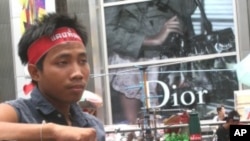Leaders of Thailand's anti-government red shirt movement have reacted warmly to a government plan to end protests that have crippled the nation's capital. But many grassroots members on the streets are reluctant to give up after nearly two months of protest.
Prime Minister Abhisit Vejjajiva has offered elections by November and other measures to convince Red Shirts to clear out from the city's glitzy Rajaprasong shopping district.
On Tuesday, Red-Shirt leaders welcomed the plan, even though it falls short of their demand for elections to be held within three months.
But in the Red Shirts' vast fortified camp, protesters say they have little trust in government efforts to end the political standoff.
Wassana Puangnagpan is from Bangkok's outskirts, and sells t-shirts at the rally. She says Mr. Abhisit's proposed election date in November is too far away.
She says the parliament should be dissolved immediately so the Thai people can have a genuine democracy. She says it is about time Thailand had a leader from among the common people, not aristocrats.
Thailand voters are bitterly divided between Red-Shirt supporters of former Prime Minister Thaksin Shinawatra and backers of the current government, which took power in 2008 after courts dissolved a Thaksin-aligned ruling party.
A military coup ousted Mr. Thaksin in 2006. Many in Thailand's urban middle class and traditional elites consider him authoritarian and corrupt. But rural residents and the urban poor support him because of his anti-poverty measures. He now lives in exile to avoid a prison sentence for a corruption conviction.
Bloodshed - including a failed government crackdown on April 10 that killed 25 people - has further sharpened divisions.
A rice farmer from Thailand's poor northeast, Aad Imkayjorn, says she cannot forgive the government for the bloodshed.
She says she is outraged that government supporters have labeled the Red Shirts, who draw much of their backing from the poor, as "buffaloes" - a label for people seen as ignorant and stupid.
But although protesters express defiance, weariness is setting in for some.
Meleewat Watanasgulsiri, a tour boat captain from the tourist city of Pattaya, says he is tired after nearly a month at the protest camp. But he also says he simply does not trust Mr. Abhisit.
He says he would prefer to see an immediate election. But if the Red-Shirt leaders agree to a compromise, he will happily go home.
The protest site sprawls for more than four kilometers across a major intersection. It is highly organized with free food, toilets, market stalls and entertainment. Protesters sleep under canvas awnings, despite the city's heat, noise and mosquitoes.
But the camp has created traffic chaos and forced hundreds of businesses to close or curtail hours. Thousands of people have lost their jobs or have seen their incomes fall sharply. Early public support for the protesters in Bangkok has faded as the blockade continued and as the number of violent incidents continued to rise.
Organizers say they have the ability to stay for the long haul, but many protesters have been away from home for weeks, and Thailand's rainy season is just beginning.
Many Red-Shirt Protesters Skeptical of Government Offer










